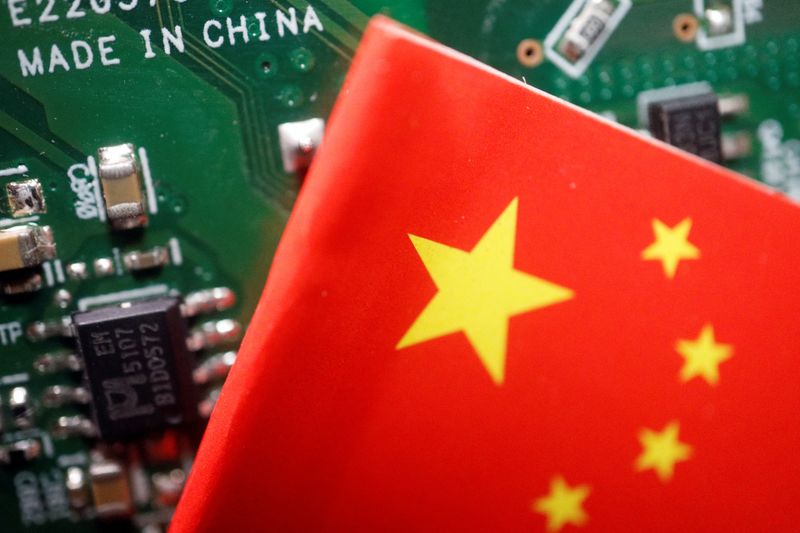By David Lawder
WASHINGTON (Reuters) -The Biden administration announced on Monday a last-minute trade investigation into older Chinese-made "legacy" semiconductors that could heap more U.S. tariffs on chips from China that power everyday goods from autos to washing machines to telecoms gear.
U.S. Trade Representative Katherine Tai said the probe aims to protect American and other semiconductor producers from China's massive state-driven buildup of domestic chip supply.
The "Section 301" probe, launched four weeks before President-elect Donald Trump takes office on Jan. 20, will be handed over to his administration in January for completion, Biden administration officials said.
The effort could offer Trump a ready avenue to begin imposing some of the hefty 60% tariffs he has threatened on Chinese imports.
Departing President Joe Biden has already imposed a 50% U.S. tariff on Chinese semiconductors that starts on Jan. 1. His administration also has tightened export curbs on advanced artificial intelligence and memory chips and chipmaking equipment.
Legacy chips use older manufacturing processes introduced more than a decade ago and are often far simpler than chips used in AI applications or sophisticated microprocessors.
U.S. Commerce Secretary Gina Raimondo said on Monday her department's research showed that two-thirds of U.S. products using chips had Chinese legacy chips in them, and half of U.S. companies did not know the origin of their chips including some in the defense industry, findings that were "fairly alarming."
China's commerce ministry said in a statement that the U.S. chips probe was "protectionist" and would hurt American firms and disrupt the global chip supply chain. It said Beijing would "take all necessary measures to firmly defend its rights and interests."
A spokesperson for Trump's transition team did not immediately respond to a request for comment.
Tai told reporters the trade agency has found evidence that China is targeting the semiconductor industry for global domination, adding: "This is enabling its companies to rapidly expand capacity and to offer artificially lower-priced chips that threaten to significantly harm and potentially eliminate their market-oriented competition."
PUBLIC HEARING IN MARCH
The Biden administration will begin accepting public comments on the probe on Jan. 6, and has planned a public hearing for March 11-12, according to a Federal Register notice on the probe, which is due for completion within a year.
The probe is being conducted under Section 301 of the Trade Act of 1974, the same unfair trade practices statute Trump invoked to impose tariffs of up to 25% on some $370 billion worth of Chinese imports in 2018 and 2019, triggering a nearly three-year trade war with Beijing.
The Information Technology Industry Council, a trade group representing the U.S. tech sector, said the probe could have complex and far-reaching implications for the global economy and supply chains and urged the USTR to "not prejudge the outcome."
Jason Oxman, the group's president, said he was concerned about the probe's launch during a presidential transition, "and we strongly urge officials in the current and incoming administrations to conduct the inquiry in an objective and collaborative manner," ITIC President Jason Oxman said in a statement.
Most U.S. smartphones, laptop computers, video game consoles and other consumer electronics products are still imported from China.
DOWNSTREAM GOODS PROBED
A Biden administration official said that in addition to examining the impact of the imported chips themselves, the probe would look at their incorporation into downstream components and end-use goods for critical industries including defense, automotive products and medical devices.

It also will target China's production of silicon carbide substrates and wafers for semiconductor fabrication.
After the COVID-19 pandemic disrupted the supply of semiconductors and temporarily halted production of autos and medical equipment, the U.S. has sought to build its own semiconductor supply chain with $52.7 billion in new subsidies for chip production, research and workforce development.

